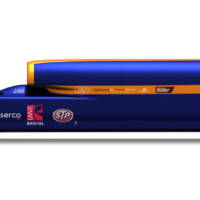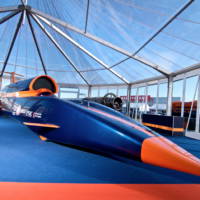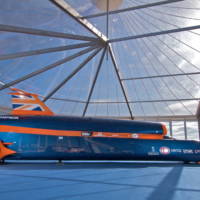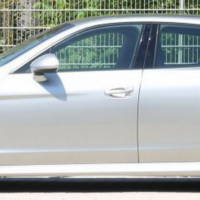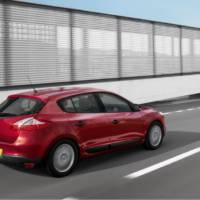This pointy looking thing is the prototype version Bloodhound SSC 1000 mph car, and was revealed at the Farnborough International Airshow.
The super sonic Bloodhound SSC which measures 12.8 meters in length comes after three years of aerodynamic development and will be the first ever vehicle which will attempt to brake the 1000 mph speed barrier.
The Bloodhound SSC is powered by a Eurofighter-Typhoon jet engine that is combined with a Falcon hybrid rocket and total output is no less than 133,150 BHP. The body is composed out of three sections which are made from polystyrene blocks and fibreglass that are covered in six coats of
aerospace paint. The Bloodhound SSC weighs 950 Kg and on paper is can accelerate from 0 to 1000 mph in 42 seconds.
The man who will try and take the Bloodhound SSC beyond speeds of 1000 mph is Andy Green, the same who is responsible for the current 763 mph land speed record set in 1997.
Tests with the Bloodhound SSC 1000 mph car will begin in 2012.
BloodhoundSSC press release :
The BLOODHOUND Project today announces the achievement of significant milestones in this iconic engineering and education adventure:
• 1.5 million school children in the BLOODHOUND Education Programme
• Life size Show Car makes world début at Farnborough
• 50% of the fuselage build now secured thanks to key product sponsor Hampson Industries
• Three new sponsors sign up
• EJ200 jet engine, runs as good as new
The BLOODHOUND Project is a World Land Speed Record attempt aiming to inspire young people to pursue careers in Science, Technology, Engineering and Mathematics (STEM subjects) by show-casing them in the most exciting way possible – by building a car capable of reaching 1,000 mph.
1. The 1.5 million pupils join the BLOODHOUND team
As of this week (19th July 2010), 3471 primary and secondary schools, 229 further education colleges and 40 universities are signed up to the BLOODHOUND Education Programme, gaining unique access to this,world class research and development programme. The BLOODHOUND Education Programme produces curriculum resource materials for all levels of education. This means that circa 1.5 million primary and secondary school pupils are now exposed to real world case studies based on the jet and rocket powered car to bring their Science, Technology, Engineering and Maths (STEM) lessons to life.
An independent study by the National Foundation for Educational Research (NFER) concluded that the BLOODHOUND Education Programme provides a genuine hook to get children interested in science and engineering. The study found that children of both sexes engaged with the exciting subject material and that it helped inspire them to think about science and engineering in new ways.
“The Farnborough International Airshow provides us with an amazing opportunity to show young people, their teachers and the World’s leading aerospace companies how the BLOODHOUND Engineering Adventure has started to influence so many pupils in a very short period of time.” Said Dave Rowley, Education director, “The uniqueness of being able to share such leading edge technology with pupils from five years of age, when they are at their most receptive, is starting to have a positive effect on them considering STEM related career options.”
Chief Executive Philip Harrison said ‘Protocol National is proud to be the official FE partner of The BLOODHOUND Project as it attempts to break the World Land Speed Record and reach over 1,000 mph. It’s a journey that really engages FE learners and inspires a generation to pursue the STEM subjects of science, technology, engineering and mathematics.’
2. World début of the full size show car
12 noon Monday 19th July at our stand, OE16
Today the BLOODHOUND team unveils, for the first time, the complete life size Show Car, which at 12.8m, is longer than four Minis parked end to end.
The 1:1 replica is the result of three years of aerodynamic study and ten exhaustive design evolutions to perfect the shape and aerodynamic package of the planet’s ultimate car.
World class aerodynamic research using Computational Fluid Dynamics was conducted by Swansea University, MathWorks and EPSRC, and at key moments the Project utilised more computing power than the Met Office (courtesy of IT Partner Intel). The BLOODHOUND aerodynamic team, lead by Ron Ayers, generated millions of mathematical equations to investigate how the air around the car would react as the car accelerates to its maximum design speed of 1,050 mph. Using this information they then designed the an efficient shape that would be stable at supersonic speeds, and controllable a sub-sonic velocity.
The Show Car started life as 5 m3 polystyrene blocks, which were then cut into bucks and moulds using 3 axis machining by Baker Patterns of Birmingham. Fibreglass and resin was then laid over the bucks in a process that took many thousands of painstaking hours to hand finish. The work was done by CHW Composites and Mike Horne Design on the Isle of Wight, who previously worked on ThrustSSC – still the only car in the world to have officially gone supersonic. The BLOODHOUND model was then given the six coats of Akzo Noble aerospace paint by Jon Benton and his team at Aero-Composites, who are more used to painting military and civil aircraft than forty- four foot long ‘streamliners’. The 950kg showcar, which separates into three sections, was then transported to Farnborough by hauliers G&J Lockwood Ltd.
3. The BLOODHOUND Driving Experience – launched
Imagine travelling ten miles in just one hundred seconds… Thanks to the BLOODHOUND Driving Experience, débuting at FIA, you can get behind the wheel of the world’s ultimate racing car and find out just what it takes.
This immersive experience was developed with the help of IT Partner Intel, the University of Southampton, Cursive Simulation, The Race Centre, the University of the West of England Bristol (UWE) and Escape Studios. The BLOODHOUND Driving Experience is powered by an Intel® Core™ i7 processor, specifically designed for multimedia applications and enabling the system to deliver stunning graphics accurately representing life at 1,000 mph.
The state-of-the-art graphics are delivered by the Gamebryo Lightspeed game engine from Emergent Game Technologies, an award-winning platform most commonly used in chart-topping console games and ultra-realistic military training simulators.
Taking Andy Green’s place in the cockpit, visiting test drivers will face the ultimate multi-tasking challenge: monitoring and controlling three separate engines whilst keeping the 133,000bhp car on course on the way up to Mach 1.4.
Virtual land speed racers will have to balance the jet and rocket thrust, accelerating the jet and firing the rocket at precisely the right time to reach maximum speed in just four and a half miles. Drivers will need lightning-fast reflexes to mitigate the effects of cross-winds and surface changes, then juggle air brakes, parachute and wheel brakes to haul the 6000kg car down from fifteen times the national speed limit to standstill, to finish at an exact location in the desert.
4. Major new sponsors announced
BLOODHOUND are delighted to announce a NEW product sponsor: Hampson Industries. World leaders in the design and manufacture of close-tolerance tooling and assembly systems for composite and metallic aero structures, Hampson will manufacture the primary rear structure of the supersonic car from a combination of steel, titanium and aluminum. This will involve both traditional skills along with the latest high speed machining technologies and utilise some of the largest stretch forming capabilities in Europe.
“With Hampson Industries on board we have secured the build of half the Car’s fuselage: this marks a huge step in the life of the project,” said Richard Noble, Project director, “Hampson Industries is representative of the wealth of skills we have here in the UK and underlines the importance of maintaining this expertise.”
The rear structure of the car is of critical importance: it has to handle the 9 tonnes of jet thrust from the EJ200, plus 12 tonnes of thrust from the Falcon hybrid rocket, the vibration and high temperature from both jet and rocket, the suspension loads. And then, when the thrust stops, there are 9 tonnes of brake chute drag.
The Institution of Mechanical Engineers has joined the Project as a stripe sponsor. Its strap line “Improving the world through engineering” fits very well with the BLOODHOUND Project ethos.
Stephen Tetlow, Chief Executive, Institution of Mechanical Engineers, said: "We are delighted to be a partner in the BLOODHOUND project in what is undoubtedly a shining and leading example of the exciting, world-beating modern engineering going on in Britain today.”
"This is all about inspiring the next generation of engineers and scientists and it doesn’t get more exciting than this. With over 90,000 of our members across the world, BLOODHOUND supports our own vision to encourage and build upon the incredible engineering talent we have, not just in this country but in all corners of the world. There is an untapped talent pool of young scientists and engineers out there and through this partnership we will be reaching out to them."
Promethean, a global leader in interactive learning technology, has become the official interactive education technology partner of the BLOODHOUND Project. The BLOODHOUND Education team will work closely with Promethean to deliver its international education programme, reaching beyond the 1.5 million pupils currently using BLOODHOUND education resources.
Promethean will be installing its ActivClassroom technology in BLOODHOUND’s forthcoming education centres, creating the ‘classroom of the future’ and will be equipping BLOODHOUND’s education ambassadors with relevant software and resources for use in schools.
“In the 1960s, the goal of putting a man on the moon inspired an entire generation to take interest in STEM. We hope BLOODHOUND will have the same ‘Apollo Effect’ for this generation,” says Jim Wynn, Chief Education Officer at Promethean.
5. EJ200 record engine test 100% successful
Last week the Eurofighter Typhoon jet engine that will be used during the landspeed record-attempts successfully completed a rigorous test session.
The EJ200 will be used to power BLOODHOUND SSC from 0 to 300 mph during its desert runs in 2012. Prior to being put on show at FIA, it was driven to full power on reheat in a series of controlled bench-tests, producing a maximum thrust of 90 kN (20,000 lbf) with no problems.
Having completed its life as a development engine for the Typhoon programme, the 1.5 tonne engine is now on loan to the BLOODHOUND Programme. It will partner the largest hybrid rocket ever designed in Europe to produce a combined thrust of 212 kN (47,500 lb) – the equivalent to 180 F1 cars – and propel driver Andy Green from 0 to 1,000 mph in 42 seconds.
“Seeing our EJ200 run on the test bed was an amazing sight, and marks a significant milestone in the development of BLOODHOUND SSC.” Said Mark Chapman, Chief Engineer, “There’s a feeling in the team that everything is starting to become very real and that BLOODHOUND SSC no longer exists just on a computer screen.”
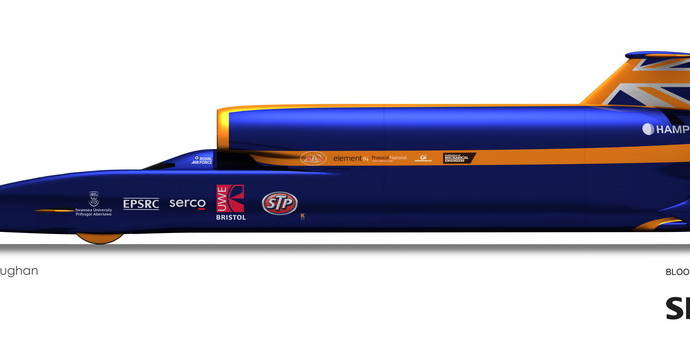
19 Jul 2010
0

